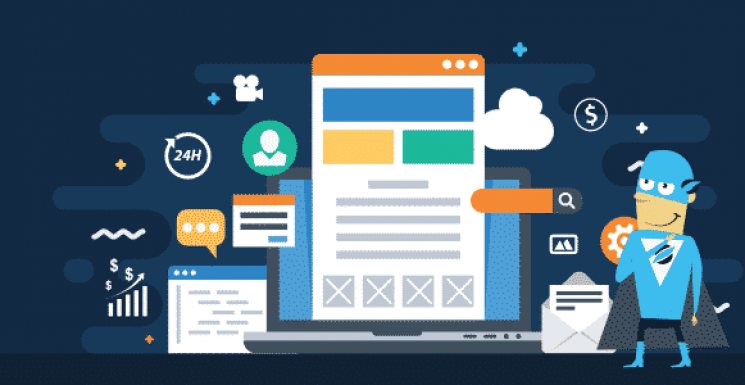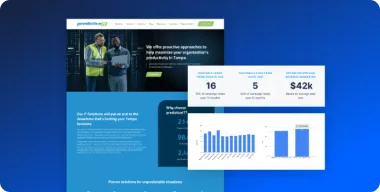As a small-business owner, creating a new website can be difficult, especially if you don’t know how to get started or if you start getting overwhelmed with all the technical lingo. So when you come across an ad saying “Create a modern website under 10 mins for free” you’ll probably click on it, right?
We get it, you just need something to send your prospects to and an online platform to start building some kind of brand presences online. That said, a lot of owners rush to get something — anything, really — up and running without considering the dozens of factors that influence how effective their website is as a marketing tool.
To help you get the most out of your website, we’re going to look at why working with a professional to build it is recommended. We’ll also discuss what happens after your site goes live, and why these third-party website builders are somewhat restricted when it comes to matching the needs of your specific business.
A website is a website, right? Not quite
A website is the ultimate marketing tool. It describes your business, sells your services, provides thought leadership, and allows visitors to contact you, all from a handful of (hopefully well-crafted) pages. Using a self-service tool may be less expensive and a bit easier than hiring a pro, but it causes you to miss out on a lot of the value-add that a freelance developer or agency brings to the table. To start, when using one of these DIY tools, you are restricted to a handful of templates. Several of these tools allow you to customize templates down the line, but to what degree is often restricted by their user interface. In short, you need to use their blocks and options, which can result in a generic-looking website. Additionally, these services don’t offer the insight and expertise needed to optimize your site for performance. That means things like:- Content development
- Image and video selection
- Advanced search engine optimization
- Custom interfaces to fit your specific offerings
More: Attract
Quick tip guide to proper content curation
How to make a video studio at your office
[Practical Guide] SEO for Business: Part 1 – Your Website
What happens after your site goes live?
Even the simplest, most user-friendly systems require maintenance to ensure they meet current web standards. For today’s websites, that means SSL certification on all domains, code updates when browsers are updated to new versions, plugin updates or replacements as new options become available, and search engine optimization tasks. A working knowledge of HTML and CSS — two of the coding languages used to build a website — is highly recommended to ensure quick and easy changes. This is where having an agency partner can really benefit you. While a freelance developer will have all these skills, their availability may change over time, whether because they get sick, go on vacation, have a baby, get a full-time job, etc. Then you’re left without a dedicated partner to keep your website up to date. A well-staffed agency will always offer the resources needed to keep your site humming along, with much of the support happening in the background. Making sure your site is reliably supported and up to date can significantly impact your business. Standards for popular web browsers, like Google’s Chrome browser, are constantly changing. And meeting browser standards is a major criterion for Google to determine your rank in organic search results. So if your site lacks SSL certificates, isn’t mobile-friendly, and loads sluggishly enough to frustrate users, you’re going to see less traffic — and consequently fewer leads and sales.The restrictive nature of DIY website platforms
For those eager to launch a website as quickly as possible, the DIY sites get the job done. They are fast and relatively easy to use for a basic, no-frills layout. But what if you have more time and money to invest, and you want to build a site that provides a better, more unique experience that represents your business? This is where these DIY sites can fail. By their nature, they are restrictive. The drag-and-drop interface offers a limited number of solutions. If you have a specific function you later need to integrate, it can be difficult, and in some cases impossible depending on the platform. This could be the integration of a new CRM or marketing platform, the use of video instead of images on key parts of your website, or the use of custom features for your forms, or even just the way your content is laid out. Whatever your needs are from a technical and interface perspective, it’s a lot easier to customize a site built on a flexible platform like WordPress than it is to twist and bend a DIY tool to fit your needs. And it’s not uncommon for you to bend and then break your DIY website, which means calling into a support line for someone to talk you through fixing your now broken web page.Knowing What to Do Next
If you are preparing to have a website built, take the time to consider all your options and the potential pros and cons of each. If you are a brand new business or a 1-person company, DIY sites are a godsend and the tradeoffs are very reasonable. For businesses looking for more support and customization, freelancers and agencies are likely to deliver more value over time. If you already have a website built and are looking for help overcoming your specific challenges, we can help. Pronto works with all varieties of small business to build websites that deliver results, and we provide a done-for-you service that makes maintaining a great website a no-brainer.Want to take your Website & Marketing to the next level?
If you feel confused or overwhelmed, don’t be. Pronto has you covered. With over 1500+ WordPress websites under our belt, we can help you with all your digital marketing needs needs and more — from websites all the way to Integrating platforms.
Schedule a call with one of our Pronto Experts and learn how we can secure your website so you can focus on your business.




